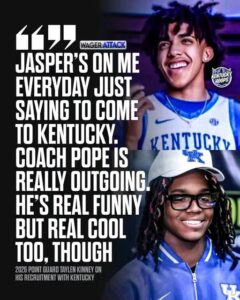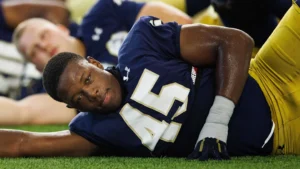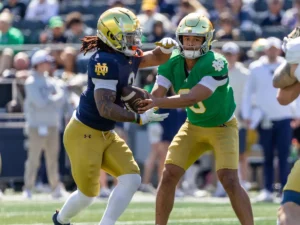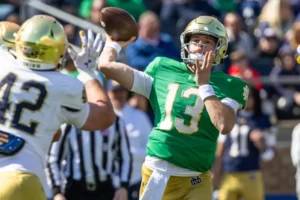
Tyrese Proctor Declares for NBA Draft, Closing a Promising Chapter at Duke
Tyrese Proctor is taking the next step in his basketball journey. The Duke guard officially declared for the 2025 NBA Draft, announcing his decision through a social media post that quickly sent ripples through the college basketball world. Proctor’s departure marks the end of a two-year run at Duke that saw flashes of brilliance, moments of growth, and the steady maturation of a player whose potential has long had scouts and fans alike intrigued.
The announcement wasn’t necessarily a surprise. Proctor entered the 2024-25 season with NBA aspirations clearly in mind, and despite battling through some injuries and inconsistency, he displayed enough talent, polish, and two-way versatility to convince NBA front offices of his value at the next level. For Proctor, it’s the realization of a goal set in motion long before he ever suited up for the Blue Devils.
Originally from Sydney, Australia, Proctor joined Duke as part of the heralded 2022 recruiting class, reclassifying a year early to arrive in Durham in time for Jon Scheyer’s first season as head coach. Even at 18, his court vision, perimeter poise, and feel for the game stood out. Proctor’s international experience — he played for Australia’s national team at various youth levels and trained within the country’s elite basketball pathway — gave him a professional edge and understanding of team basketball that complemented his individual skills.
As a freshman, Proctor had to adjust to the physicality and pace of college basketball. He was thrust into a larger role midway through the season, particularly as injuries impacted Duke’s rotation. Over time, his comfort level grew, culminating in several standout performances late in the year. His improved decision-making, defensive chops, and ability to knock down timely shots earned praise from Scheyer and made him a key figure in Duke’s postseason push. Though the Blue Devils’ tournament run fell short of expectations, Proctor’s emergence offered a silver lining and a strong foundation for the future.
Returning for his sophomore year, Proctor was expected to take on a leading role, both on the court and in the locker room. Alongside fellow stars like Jared McCain, Mark Mitchell, and Kyle Filipowski, he was part of a Duke core that entered the season with national championship aspirations. The team faced adversity early, dropping a few unexpected games, but Proctor’s steady hand at point guard helped them regain rhythm as the year progressed.
Injuries did disrupt Proctor’s sophomore campaign, including a lower leg injury in December that sidelined him for several weeks. Upon his return, he showed flashes of the player many projected as a first-round pick: confident off the bounce, vocal on defense, and capable of running the offense with a high IQ and unselfishness. His chemistry with McCain in the backcourt created a dynamic that made Duke tough to guard — Proctor’s ability to initiate, play off-ball, and guard multiple positions gave Scheyer flexibility in his lineups.
By March, Proctor was rounding into form. He played some of his best basketball in the ACC Tournament and looked poised for a breakout NCAA Tournament. While Duke made a run to the Elite Eight, their season ended in disappointment against a deeper, more physical opponent. Still, Proctor’s stock had stabilized. He averaged just under 10 points per game while contributing around four assists and two rebounds. His shooting percentages weren’t eye-popping, but his mechanics, shot selection, and floor leadership remained attractive traits for NBA scouts.
What separates Proctor in the eyes of NBA decision-makers is his feel for the game. He doesn’t force the issue, sees plays before they develop, and has the kind of natural timing and pace that can’t be taught. Though not a high-flyer or volume scorer, his understanding of space, angles, and rhythm make him a potential high-level role player in the NBA. He’s a connector — the type of guard who keeps things flowing, makes the right reads, and doesn’t need to dominate the ball to impact the game.
Defensively, he’s solid. At 6-foot-5 with a lean frame and long arms, Proctor can guard both backcourt spots. His footwork and lateral quickness are sound, and his instincts allow him to jump passing lanes and disrupt opponents without gambling excessively. In the NBA, he’ll likely be asked to defend second units or complementary guards, and he projects as someone who could become a plus defender with added strength and continued growth.
There are areas he’ll need to improve to maximize his NBA ceiling. His three-point shooting — while serviceable — must become more consistent. He shot in the low 30s from deep during his Duke tenure, and spacing is king at the next level. Proctor’s shot mechanics are fundamentally solid, but developing a quicker release and more confidence shooting off movement will help him thrive in a league where floor spacing and perimeter efficiency are non-negotiables.
Additionally, Proctor will need to assert himself more offensively. At Duke, he often deferred to scorers around him. While that unselfishness is one of his strengths, NBA teams want to see prospects who can take over stretches of games and create offense in late-clock situations. He showed glimpses of that aggressiveness at times, but unlocking that next gear will be critical if he hopes to carve out a long-term role at the professional level.
His decision to declare comes as part of a broader turnover at Duke. With multiple underclassmen testing the NBA Draft waters, including McCain and Filipowski, Scheyer’s squad is likely to look very different in 2025-26. That’s the nature of modern college basketball, especially at blueblood programs like Duke where elite talent cycles in and out quickly. Proctor’s two years in Durham may not have included a national championship or lottery pick-level breakout, but his presence helped stabilize a program navigating the post-Coach K era.
For Proctor, declaring for the draft is a leap of faith, but a calculated one. He’s projected as a late first-round to early second-round pick, depending on team needs and his pre-draft process. He’ll have the chance to shine in workouts, interviews, and possibly the NBA Combine, where his personality, maturity, and basketball IQ could win over executives. Given his age, pedigree, and versatility, Proctor fits the mold of a developmental guard who could thrive in the right system.
There’s also a quiet confidence to Proctor that makes it easy to root for him. He never chased the spotlight at Duke. He stayed steady, focused on getting better, and embraced the work required to improve. That mindset will serve him well in the NBA, where patience and adaptability are key. He’s not the kind of player who’ll make headlines with flashy highlights or gaudy numbers, but he’s the kind who helps teams win — the kind who understands his role and delivers within it.
In a league that increasingly values high-IQ guards who can play on or off the ball, switch defensively, and knock down shots, Proctor has a chance to carve out a sustainable career. Much will depend on where he lands, the context of the team around him, and his ability to continue adding to his game. But the foundation is solid. The tools are there. And most importantly, the mindset appears to be in place.
As Duke fans reflect on Proctor’s time in blue and white, they’ll remember a guard who never quite demanded the spotlight, but always belonged in it. His contributions won’t just be measured in points or assists, but in how he carried himself — poised, thoughtful, and committed to the team above all else. He helped lay the groundwork for what Jon Scheyer hopes will be a sustained era of excellence. Now, his own journey continues.
The NBA awaits Tyrese Proctor. And while the road ahead is uncertain, it’s one he’s been preparing for his whole life.





